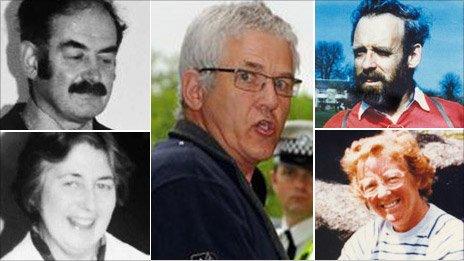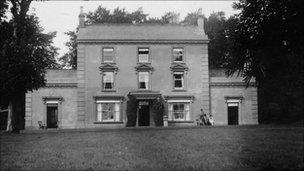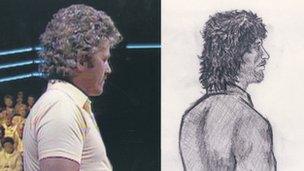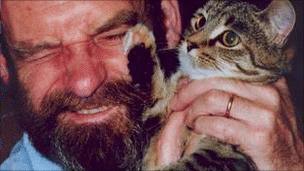John Cooper: Prolific thief who turned multiple killer
- Published

John Cooper (pictured centre) executed Richard and Helen Thomas (left) in 1985 and Peter and Gwenda Dixon (right) in 1989.
When John Cooper murdered brother and sister Richard and Helen Thomas at their house in Pembrokeshire in 1985 he was already a prolific burglar.
His son told the jury at Swansea Crown Court how his father would go out at night with a shotgun concealed under his coat.
He used it on 22 December 1985 at Scoveston Park, first killing Miss Thomas, aged 56, and then Mr Thomas, 58.
The prosecution said it was likely Miss Thomas was shot as Cooper was disturbed while breaking in.
It is possible she recognised him or his voice as he lived and worked as a farm labourer nearby and was known to her and her brother.

Cooper shot brother and sister Richard and Helen Thomas at their home on 22 December 1985
Mr Thomas was not there at the time but when he returned he was also shot before Cooper set fire to their three-storey house to cover his tracks.
Four years later he confronted holidaymakers Peter and Gwenda Dixon, aged 51 and 52 and from Oxfordshire, on the Pembrokeshire coastal path near Little Haven.
Before shooting the couple at point blank range he had tied them up and demanded their bank card, forcing them to disclose the pin number.
He then used that to withdraw money at cash machines in the county and on the day their bodies were discovered in undergrowth he sold Mr Dixon's wedding ring to a jeweller for £25.
The jury was shown a clip of Cooper appearing on the ITV darts-themed gameshow Bullseye recorded two months before the Dixons were killed.
The prosecution said his appearance at the time matched an artist's impression of a man seen outside a bank when the card was used to withdraw money.
The jury heard that Cooper, who was born in September 1944, left school at 15 and worked in various trades.
He married his late wife Patricia in 1966 and the couple had two children - a boy and a girl.

The jury was shown a clip of Cooper appearing on Bullseye and an artist's impression of a suspect
While working as a welder's mate at the old Gulf oil refinery at Milford Haven in 1978 he won £90,000 and a new car on a spot the ball competition and shortly after quit work to set up and run a family smallholding.
But, through a series of loss-making house moves and a gambling habit, the prosecution case was Cooper frittered the money away.
Certainly by 1983 police said he had started his career in burglary that eventually led to 30 convictions, although he was linked with many more.
Cooper was a fisherman who enjoyed the outdoors, and the prosecution said his knowledge of the fields and paths around Milford Haven gave him free rein to target houses in the area.
Cooper's son told the court his father was fascinated by survival programmes on television and even kept a copy of the SAS handbook.
He would stash coins, jewellery, silverware and photograph frames under lock and key wherever the family was living at the time.
It was put to Cooper during his trial he would regularly have bonfires in his back garden on which he would burn jewellery as means of identifying any valuable stones and metal he had stolen.

The prosecution said Cooper sold Peter Dixon's wedding ring for £25
The attempted robberies of five teenagers he cornered in a field near the Mount Estate in Milford Haven in March 2006 occurred at a time he was targeting homes in that area.
One of the teenagers was raped at knife point during the terrifying ordeal and another sexually assaulted.
It was an armed robbery two years later at a house in the village of Sardis that eventually led to his capture.
He was sentenced to 16 years in prison when convicted by a jury in 1998 of 30 counts of burglary and the robbery.
While he was still behind bars for those crimes Dyfed-Powys Police started a cold case review of the double murders of the 1980s.
Advances in forensic techniques meant they were able to link items used in the Sardis robbery with the killing of the Dixons.
These included the double-barrelled shotgun used by Cooper, which was found to have a trace of Mr Dixon's blood under the paintwork Cooper had since added.
Shorts found in his bedroom at the time of his arrest in 1998 were also found to have Mr Dixon's DNA on them, along with that of his daughter Julie.
Among the many items Cooper had squirreled away in the hedgerows near his house at 34 St Mary's Park, Jordanston, where he lived for much of the 1980s and 90s, was a sock that belonged to Mr Thomas.
On 13 May 2009, just a few months after he was released from prison for the burglaries and robbery, Cooper was back in custody for the killing of the Thomases, the Dixons and the attack on the teenagers at the Mount Estate.
As he was led into Haverfordwest magistrates court two days later he shouted at waiting photographers and television crews: "You must judge me after the trial and not before."
The jury has done just that and Cooper is now likely to be remembered as one of the most notorious killers in modern Welsh history.
- Published26 May 2011